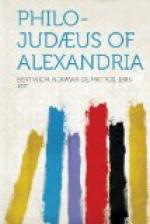Philo is conservative then in practice, but he is pre-eminently liberal in thought. The perfect example himself of the assimilation of outside culture, he demands that Judaism shall always seek out the fullest knowledge, and in the light of the broadest culture of the age constantly reinterpret its religious ideas and its holy books. Above all it must be philosophical, for philosophy is “the breath and finer spirit of all knowledge,” and it vivifies the knowledge of God as well as the knowledge of human things. Without it religion becomes bigoted, faith obscurantist, and ceremony superstitious. But the Jew does not merely borrow ideas or accept his philosophy ready-made from his environment; he interprets it afresh according to his peculiar God-idea and his conception of God’s relation to man, and thereby makes it a genuine Jewish philosophy, forming in each age a special Jewish culture. And as religion without philosophy is narrow, so, to Philo, philosophy without religion is barren; remote from the true life, and failing in the true purpose of the search for wisdom, which is to raise man to his highest function. Philosophy, then, is not the enemy of the Torah: it is its true complement, endowing it with a deeper meaning and a profounder influence. Thus the saying runs in the “Ethics of the Fathers,”
[Hebrew: ’m ’yn tora ’yn hkma; ’m ’yn hkma ’yn tora]
“If there is no Torah, there is no wisdom; if there is no wisdom, there is no Torah.” The thought that study of the law is essential to Judaism Philo shares with the rabbis, and the Torah is in his eyes Israel’s great heritage, not only her literature but her life. As Saadia said later,[365] “This nation is only a nation by reason of its Torah.” It is because Philo starts from this conviction that his mission is so striking, and its results so tragical. The Judaism which he preached to the pagan world was no food for the soul with the strength taken out to render it more easily assimilated. He emphasizes its spiritual import, he shows its harmony, as the age demanded, with the philosophical and ethical conceptions of the time, but he steadfastly holds aloft, as the standard of humanity, the law of Moses. The reign of “one God and one law” seemed to him not a far-off Divine event, but something near, which every good Jew could bring nearer. He was oppressed by no craven fear of Jewish distinctiveness; and the Biblical saying that Israel was a chosen people was real to him and moved him to action. It meant that Israel was essentially a religious nation, nearer God, and possessed of the Divine law of life, and that it had received the Divine bidding to spread the truth about God to all the world. It was a creed, and more, it was an inspiration which constantly impelled to effort. It would be difficult to sum up Philo’s message to his people better than by the verses in Deuteronomy which he, the interpreter of God’s Word and the successor of Moses, as he loved to consider himself, proclaims afresh to his own age, and beyond it to the congregation of Jacob in all ages, “Keep therefore my commandments and do them; for this is your wisdom and your understanding in the sight of the nations, which shall hear all these statutes, and say, Surely this great nation is a wise and understanding people.




